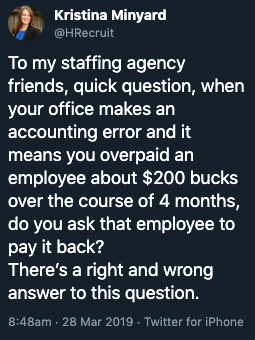For those who don’t know my mother passed away unexpectedly late last week and earlier this week, I gave her eulogy. Thank you to the hundreds of friends who reached out to me. I completely overwhelmed by the outpouring of love and support.
For those who don’t know my mother started the business, I run today, HRU Technical Resources, and was a big part of the business for forty years. Click on this link and take a look at the picture of my Mom – that was taken the first week she started the company. She was 32 years old!
As you can imagine, as a son, I never in a million years thought of giving a eulogy to my own mother, and the woman I’ve worked for, for nearly two decades. At work, she was Judy, at home, she was Mom. Growing up, I’m sure my boys were very confused!
She was the queen of rules and so when I sat down to write the eulogy I came up with the Rules that I think symbolized her life the best. I wanted to share because I think there’s learning in them for all of us. Enjoy:
Rule #1: It only costs a little more to go first class.
So, she told me she stole this from my Poppi (my grandfather). And for those who travel, you actually know this is far from true! It costs a ton more to go first class!
But she said this all the time, and for her, it really meant if you’re going to do something, do it right, do it “first-class”. No one wants second-class, so if you have the time and resources, go all the way.
It’s really a great way to live your life. First-class doesn’t mean the most expensive. For Judy, it was more of how you made others feel and what experience you could give them. When the grandkids came to visit, she wanted them to feel special, she wanted them to have a first-class experience.
Rule #2 – You have to say Yes to adventure.
Judy was fearless! When she was younger she road motorcycles, water skied, did all kinds of crazy stuff. She wanted to live on the edge and experience things. We have pictures of her riding jet skis, snowmobiles, mopeds, etc. She loved speed.
She also loved to travel and see all kinds of places – mostly in the U.S. She often said that there were so many places to see in the U.S., she couldn’t see flying all over the world, when she still had so many great places to see right here at home.
Judy was that person who was pushing you do stuff you probably didn’t want to do, and she was such a great salesperson, you usually ended up doing it!
Rule #3 – Call them again.
I remember coming into her office one day when I first started working as a recruiter for her. I had called an entire file of resumes and no one wanted the job I had to fill. I went in and said, no one wants this job, I called every single one, I don’t know what to do next.
She simply looked at me and said, “Call them all, again!”
But I already called them! Are you listening to me!
Yep – call them again.
So, I leave, pissed off, and go back to my desk and I’m like what the heck am I going to do calling all these guys again. But I did it. I called them again, and I’m like, “I’m sorry, I know I just called you, but I really need to find someone for this job. Is there anything you can do to help me?” And guess what, they did!?
Judy knew if I called them again and asked them in a different way, or asked them different questions, they all had some piece of knowledge that would help me. I didn’t do it the first time. I only asked them the one question – do you want this job. They didn’t. But Judy knew they knew someone who might or someone who knew someone, etc.
While you would think this is only a recruiter story it isn’t. It’s a life story. It’s about getting something positive out of every interaction you have. Yes, they had something I needed, and if I could give them something they needed, it would most likely work out for both of us.
Rule #4 – People have no idea how successful they can be until you push them out of their comfort-zone.
This was more of a core philosophy of Judy’s then a rule! Judy saw something in most people that they didn’t see in themselves.
She really didn’t know anything else. If she knew you, and she cared about you, she was going to push you past a point you felt comfortable with. What she knew in her soul was that each of us had the ability to be successful, but the vast majority of us are unwilling to push ourselves to the point of being uncomfortable.
So many people hated my Mom for doing this. They thought she was a tyrant! But some actually had that lightbulb moment afterward and got it. “You know, I never would have reached this level if it wasn’t for Judy pushing me beyond a point that I never thought I could reach!”
I think this is what she enjoyed most out of running a company. She LOVED to see people succeed beyond a point they never thought they could achieve. There was no greater joy for her. Even beyond her own success, what she really wanted was to see those who she cared about succeed.
Rule #5 – Only you can decide what attitude you have. No one else can choose that for you.
My mom was mostly a positive person. If she caught herself feeling down, she would force herself back to positive. If those around her were negative, she would get very irritated by that and work to get them to be positive.
Without knowing it, she was actually using a very good psychological trick. Have you ever watched a video of a baby laughing? The pure joy of that. No matter what attitude you’re in, you can’t help but to smile or even laugh yourself.
Judy knew that even if she wasn’t feeling positive, if she made herself be positive, it would actually change her brain chemistry and she would start to feel positive, and once she was feeling positive, she would be positive.
It seems too simplistic to work, but it works! Turns out, if you want to be positive, just start acting positive and pretty soon positive stuff will start happening!
Rule #6 – You don’t need a man for anything, unless there’s a car door, then you need a man to open your car door!
Remember when they were full-service gas stations!? The guys would come out and pump your gas why you stayed in your car. Clean your windows, etc. Now everything is self-service.
When self-service gas stations first came into vogue – Judy would drive up and just sit there and wait. Eventually, someone guy would get out of his car behind her and come up to her window and ask if something was wrong. She would say No, and hand him $20 dollars telling him to fill it up! And they would!
Don’t get me wrong – my Mom loved men. She loved being chased by men. She loved them getting her flowers and gifts. She loved them taking her to dinner and dancing. She loved the game. But it was a game for her. There were very few things in life she needed from a man, and she loved that feeling!
Rule #7 – If you force me to make an immediate decision, you’re going to get an emotional decision. If you give me time to contemplate this decision, you’ll get a much better decision.
This rule saved my relationship with my Mom/my Boss. For those who don’t know. My mom fired me. She fired me because I was young, and stupid, and full of fire and emotion (thankfully she hired me back a decade later!). I forced her to make decisions at the moment, and Judy did not like to be forced to do anything.
Upon my re-hire, many years later, we sat down and had some really great conversations and learned how to communicate with each other, and I learned this was something she actually needed. Judy was street smart, she wasn’t book smart. So, many of the things I wanted to do, as the business evolved were complex and she needed time to think about them and understand them.
If I gave her time, she almost always came back and we would make a better decision. Sometimes we don’t have the time, but if you do, give it and let the person do some thinking on it.
Rule #8 – If you look unsuccessful, you’re most likely going to be unsuccessful.
My mom hated causal Fridays!
She wanted all of us to wear suits and be clean shaven and smell good. Wear a gold watch and drive a Cadillac, and that car better be clean, inside and out.
Now, you might look at this as old school thinking, but what she knew was it wasn’t about you. It was about how others view you. We all have a choice of who we work with. Do you want to work with a slob or someone who took the time and care to make themselves look great for you?
The world changes – but this still holds true. Why the fashion of the day changes and the world has become more casual in general. We are still drawn to people who have that look like they have their shit together. Especially, if we are going to be spending some money with them!
Rule #9 – When in doubt, laugh.
Something most people don’t know, my Mom loved laughing! She loved watching stand-up comedians, going to comedy clubs, watching comedy movies. Anything that could make her laugh, she was all in.
That’s where I come in.
I truly believe God put me on this earth to not only make my Mom laugh but to make all of these women in my life laugh (My grandmother is the matriarch of our family, my Mom was one of five daughters and my sister was the first grandchild, I was the second). Their lives haven’t always been easy. Quite frankly sometimes life sucked and was hard. There will probably be some hard times to come. Today is a hard time.
But, when I get them around the kitchen table and we start telling stories, I can get them laughing so hard they are literally crying. My mom loved to laugh and my gift to her was being able to make her laugh so often throughout her life.
This great big dance we do in life comes with some hard times and great times, and all along the way, when in doubt, laugh at it all!


